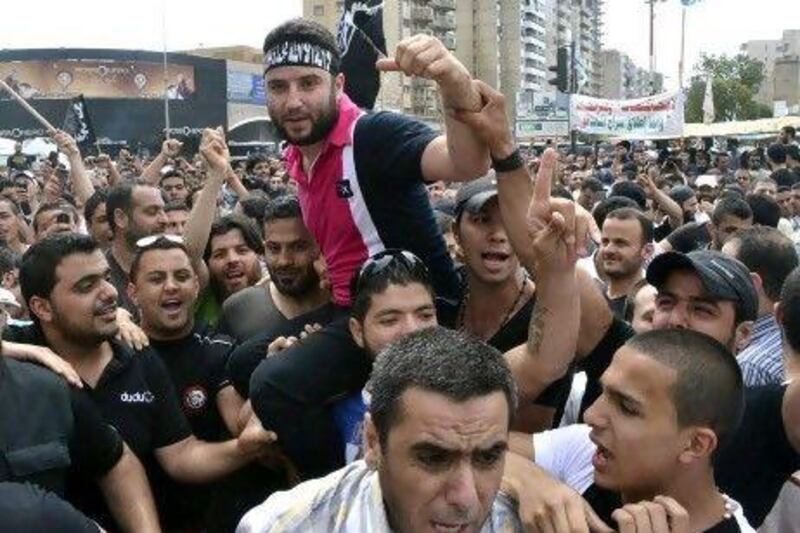BEIRUT // An uneasy calm yesterday settled over Lebanon, a day after violence burst onto the streets of its capital that many fear stemmed from unrest spilling over from Syria.
Analysts say the gun battles in Beirut that killed at least two people may portend more trouble for this divided country, which has tried to avoid being entangled in Syria's 14-month uprising.
They say the key pillars of Lebanon's stability - the government's policy of neutrality on the Syria rebellion and the army's reputation as an impartial arbiter over Lebanon's often feuding religious communities - have been shaken, largely due to a growing discontent among Lebanon's Sunnis.
They have defied government policy by supplying Syria's largely Sunni-led rebels with money and, many say, weapons. They also appear to be turning on Lebanon's military, which shot dead on Sunday a prominent Sunni cleric who was critical of Damascus.
This would inevitably fuel more unrest, said Amal Ghroyeb, an independent political analyst in Beirut and author of a book on Lebanon's Shiite movement, Hizbollah.
"While the prime minister is neutral and the army wants to be neutral and independent in putting down this violence, the genie is out of the bottle now," she said. "The violence is going to continue."
On Monday, Sunni factions battled in Beirut with rocket-propelled grenades and machine guns. The fighters also intentionally fired at soldiers who responded to put down the battles, Foreign Policy, a US magazine, reported on Monday.
The military had shot and killed Sheikh Ahmed Abdul Wahid, a Sunni cleric, and his bodyguard, at a military checkpoint a day earlier.
The military expressed regret and said it would launch an investigation in the killing, but angry mourners at Abdul Wahid's funeral on Monday, in the northern Akkar district, expressed rage.
<
Yesterday protesters blocked roads there for a third day, a security official said.
Khaled Al Daher, a Sunni parliamentarian from the Future Movement of the former prime minister, Saad Hariri, called for executing the perpetrators of Wahid's death, seen as a jab at the armed forces.
Because of flaring emotion, troops have reportedly had to pull back from the Akkar area.
The military had been one of the few generally respected institutions in Lebanon, due to its reputation as an independent and non-sectarian entity, said Timor Goksel, lecturer on conflict management at the American University of Beirut and former United Nations spokesperson.
"They are trying to do the impossible in this country, but with all their flaws, they are doing a pretty good job," he said.
But the military appears to be in direct conflict with those trying to aid rebels in Syria, including many in the Sunni community.
So too does Lebanon's prime minister, Najib Mikati, who outlined his government's policy of neutrality on Syria, or "disassociation", shortly after the uprising against the regime of President Bashar Al Assad began in March 2011.
Mr Mikati, a Sunni, has the unenviable position of being torn between the contradictory demands coming from Damascus and from within Lebanon's Sunnis, said Paul Salem, director of the Carnegie Middle East Center in Beirut.
He said the Lebanese premier appears to have acquiesced to some of Damascus's dictates to rein in his country's Sunni supporters of Syria's rebels, such as the arrest in the city of Tripoli this month of Shadi Al Mawlawi. The little-known Islamist is accused by Lebanese authorities of belonging to a terrorist organisation. He was released on bail yesterday, and said that any confession he might have made about belonging to Al Qaeda was "made under pressure and torture".
"His release is the biggest proof that he is innocent," said Mr Mawlawi's attorney, Mohamed Hafza, yesterday. "My client has nothing to do with Al Qaeda or any other such organisation."
His client's arrest had triggered large demonstrations by Tripoli's Islamists and fighting between fundamentalist Sunnis and the city's community of Alawites, a branch of Shiite Islam that also is the religion of the ruling Al Assad family in Syria.
These opposing forces were placing serious stress on Mr Mikati's neutrality policy, Mr Salem said.
"At the popular level, the Sunnis' community up north wants to directly support the Syrian uprising, which is sweeping the government's policy out from underneath its feet," he said. "But at a higher lever, it seems the government is coming under pressure by Damascus to take action against them."
The result for Lebanon, he concluded, was a "higher level instability".
hnaylor@thenational.ae
Follow
The National
on
[ @TheNationalUAE ]
& Hugh Naylor on
[ @HughNaylor ]
* With additional reporting by the Associated Press





